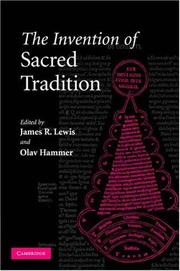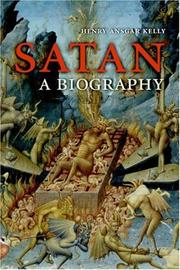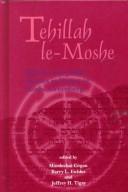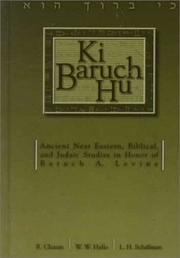| Listing 1 - 10 of 16 | << page >> |
Sort by
|
Book
ISBN: 316154398X 9783161543982 Year: 2016 Publisher: Mohr Siebeck
Abstract | Keywords | Export | Availability | Bookmark
 Loading...
Loading...Choose an application
- Reference Manager
- EndNote
- RefWorks (Direct export to RefWorks)
JiSeong James Kwon discusses similar linguistic expressions and themes between Job and Deutero-Isaiah, and attempts to find out a common historical background. He argues that both Job and Deutero-Isaiah significantly reflect common scribal ideas, although each text belongs to wisdom and prophetic genre. - From the back of the book.
Intertextuality in the Bible. --- Bible. --- Criticism, interpretation, etc. --- Prophetic Literature --- Scribes --- The Hebrew Bible --- The Old Testament --- Wisdom Literature --- Ancient Near Eastern Literature --- Altorientalistik --- Religionswissenschaft --- Antike --- Altes Testament
Book
ISBN: 1487539452 1487539444 1487508980 Year: 2021 Publisher: Toronto, Ontario : University of Toronto Press,
Abstract | Keywords | Export | Availability | Bookmark
 Loading...
Loading...Choose an application
- Reference Manager
- EndNote
- RefWorks (Direct export to RefWorks)
"The Hebrew Bible is a philosophical testament. Abraham, the first biblical philosopher, calls out to the world in God's name exactly as Plato calls out in the name of the Forms. Abraham comes forward as a critic of pagan thought about, specifically, persons. Moses, to whom the baton is passed, spells out the practical implications of the Bible's core anthropological teachings. In Persons and Other Things Mark Glouberman explores the Bible's philosophy, roughing out in the course of a defence of it how men and women who see themselves in the biblical portrayal (as he argues that most of us do once the "religious" glare is reduced) are committed to conduct their personal affairs, arrange their social ties, and act in the natural world. Persons and Other Things is also the author's testament about the practice of philosophy. Glouberman sets out, and in the chapters that pursue the theme he puts into practice, the lessons he has acquired as a lifelong learner about thinking philosophically, about writing philosophy, and about philosophers. Persons and Other Things looks closely at the Bible as a philosophical work, asking insightful questions about how to interpret the Hebrew Bible, what it means to be Jewish, and how to live a meaningful and moral life."--
Jewish philosophy. --- Bible. --- Philosophy. --- Christopher Hitchens. --- God in the Hebrew Bible. --- Jewish. --- Judaism. --- halakhah. --- metaphysics. --- monotheism. --- ontology. --- persons. --- philosophy. --- religion and religiosity. --- the category of the particular. --- writing philosophy. --- Religion.
Book
ISBN: 9781441158574 Year: 2013 Publisher: London / New York, NY Bloomsbury Academic / Bloomsbury Publishing Plc
Abstract | Keywords | Export | Availability | Bookmark
 Loading...
Loading...Choose an application
- Reference Manager
- EndNote
- RefWorks (Direct export to RefWorks)
Judaism --- Jewish society --- the Bible --- the Hebrew Bible --- the Rabbis --- Jews and the Islamic world --- Judaism and Christianity --- contemporary Jewry --- gender and Judaism --- Jewish arts and material culture --- Jewish demography --- the State of Israel
Book
ISBN: 9780521728515 9780521899864 0521899869 0521728517 9780511976391 Year: 2011 Volume: *23 Publisher: Cambridge: Cambridge university press,
Abstract | Keywords | Export | Availability | Bookmark
 Loading...
Loading...Choose an application
- Reference Manager
- EndNote
- RefWorks (Direct export to RefWorks)
The miracle stories of the founders and saints of the major world religions have much in common. Written by international experts, this Companion provides an authoritative and comparative study of miracles in not only Hinduism, Islam, Buddhism, Christianity and Judaism, but also, indigenous religions. The authors promote a discussion of the problems of miracles in our largely secular culture, and of the value of miracles in religious belief. The miracles of Jesus are also contextualized through chapters on the Hebrew Bible, classical culture to the Romans, Second Temple and early rabbinic Judaism and early Christianity. This book provides students with a scholarly introduction to miracles, which also covers philosophical, medical and historical issues
Miracles --- History --- Histoire --- 231.731 --- Miracles. --- God --- Marvelous, The --- Miracle workers --- Spiritual healing --- Supernatural --- Wonderen. Bovennatuurlijke feiten --- Religion --- General --- 231.731 Wonderen. Bovennatuurlijke feiten --- General. --- Christian spirituality --- Comparative religion --- founders of the world's major religions --- saints --- Hinduism --- Buddhism --- Christianity --- Judaism --- miracles --- secularism --- culture --- religious belief --- Jesus --- the Hebrew Bible --- Second Temple --- early rabbinic Judaism --- early Christianity --- philosophy --- medicine --- history

ISBN: 9780521864794 0521864798 9780511488450 9780521175319 0511488459 9780511369551 0511369557 9780511370076 0511370075 9780511371073 0511371071 9781281156082 1281156086 0521175313 1107178509 0511369050 9786611156084 0511370601 9781107178502 9780511369056 6611156089 9780511370601 Year: 2007 Publisher: Cambridge: Cambridge university press,
Abstract | Keywords | Export | Availability | Bookmark
 Loading...
Loading...Choose an application
- Reference Manager
- EndNote
- RefWorks (Direct export to RefWorks)
The dictionary definition of tradition refers to beliefs and practices that have been transmitted from generation to generation, however, 'tradition' can rest simply on the claim that certain cultural elements are rooted in the past. Claim and documented historical reality need not overlap. In the domain of religion, historically verifiable traditions coexist with recent innovations whose origins are spuriously projected back into time. This book examines the phenomenon of 'invented traditions' in religions ranging in time from Zoroastrianism to Scientology, and geographically from Tibet to North America and Europe. The various contributions, together with an introduction that surveys the field, use individual case studies to address questions such as the rationale for creating historical tradition for one's doctrines and rituals; the mechanisms by which hitherto unknown texts can enter an existing corpus; and issues of acceptance and scepticism in the reception of dubious texts.
Religion. --- Spiritual life. --- Religion --- Vie spirituelle --- 291 --- Life, Spiritual --- Religious life --- Spirituality --- Religion, Primitive --- Atheism --- God --- Irreligion --- Religions --- Theology --- Godsdienstwetenschap: vergelijkend --- Spiritual life --- Arts and Humanities --- Scientology --- scripture --- sacred tradition --- Carlos Castaneda --- Mormonism --- antisemitism --- conspiracy culture --- Christianity --- Islam --- counter-tradition --- the North American anti-cult movement --- Sun Myung Moon --- Divine Principle --- the New Testament --- Rosicrucian tradition --- Zoroaster --- the Urantia Book --- pseudo-Dionysius --- the Hebrew Bible --- Paganisms
Book
ISBN: 1575068516 9781575068510 9781575068183 1575068184 Year: 2013 Publisher: Winona Lake, Indiana Eisenbrauns
Abstract | Keywords | Export | Availability | Bookmark
 Loading...
Loading...Choose an application
- Reference Manager
- EndNote
- RefWorks (Direct export to RefWorks)
Religion
---
Philosophy & Religion
---
Christianity
---
Esther,
---
Ester,
---
Esther
---
Biblische Person
---
Hadassah,
---
אסתר
---
אסתר,
---
Istir,
---
Bible.
---
Altes Testament.
---
Altes Testament
---
Tenach
---
Testamentum vetus
---
Vetus testamentum
---
Erstes Testament
---
<

ISBN: 0521843391 0521604028 9780521843393 9780521604024 Year: 2006 Publisher: Cambridge: Cambridge university press,
Abstract | Keywords | Export | Availability | Bookmark
 Loading...
Loading...Choose an application
- Reference Manager
- EndNote
- RefWorks (Direct export to RefWorks)
Christians traditionally think of Satan as Lucifer, God's enemy, who rebelled against Him out of pride and then caused Adam and Eve to sin. But, as Kelly shows, this portrayal is not biblical but a scenario invented by the early Fathers of the Church which became the 'New Biography of Satan'. The 'Original Biography' must be reconstructed from the New Testament where Satan is the same sort of celestial functionary we see in the Book of Job - appointed to govern the world, specifically to monitor and test human beings. But he is brutal and deceitful in his methods, and Jesus predicts that his rule will soon come to an end. Kelly traces the further developments of the 'New Biography': humankind's inherited guilt, captivity by Satan, and punishment in Hell at his hands. This profile of Satan remains dominant, but Kelly urges a return to the 'Original Biography of Satan'.
Devil --- -235.2 --- 235.2 Kwade engelen. Demonen. Demonologie. Duivel. Satan. Lucifer. Asmodeus. Beëlzebub. Mephistoteles --- Kwade engelen. Demonen. Demonologie. Duivel. Satan. Lucifer. Asmodeus. Beëlzebub. Mephistoteles --- Beelzebub --- Beelzebul --- Lucifer --- Satan --- Satanael --- Satanail --- Demonology --- Biblical teaching --- 235.2 --- Biblical teaching. --- Devil - Biblical teaching --- Christianity --- God --- Adam and Eve --- the New Testament --- the Book of Job --- Jesus --- humankind --- Hell --- the old Testament --- the hebrew Bible --- the Angel of Yahweh --- Son of Elohim --- the trial of Joshua the High Priest --- the Book of Zechariah --- devil --- apocryphes --- the Deas Sea Scrolls --- sins --- Genesis 1-11 --- the Book of Enoch --- Mastema --- the Giant-Ghosts --- the Book of Jubilees --- Belial:the Principle of darkness --- Lady Folly --- St. Paul --- Thessalonians, 1 Corinthians --- Romans:Beliar --- the Wisdom of Solomon --- the four Gospels --- Luke --- John --- Mark --- Matthew --- John the Divine --- apocalypse --- John the Presbyter --- the pauline epistles --- Christ --- Iblis --- the koran --- literature --- art --- Dante --- Milton --- diabolical possession --- Friedrich Schleiermacher --- the Bible
Book
ISBN: 1575066165 9781575066165 9781575061726 1575061724 Year: 2021 Publisher: University Park, PA
Abstract | Keywords | Export | Availability | Bookmark
 Loading...
Loading...Choose an application
- Reference Manager
- EndNote
- RefWorks (Direct export to RefWorks)
In the Judeo-Christian tradition, the deity YHWH is often portrayed as an old man. One of the epithets used of YHWH in the Hebrew Bible, the Ancient of Days, is a source for this depiction of God as elderly. Yet, when we look closely at the early traditions of biblical Israel, we see a different picture: God is relatively youthful, a warrior who defends his people. This book is an examination of the question: How did God become old? The transformation from young deity to Ancient of Days took place at the intersection of two trajectories in the traditions of Israel. One trajectory is reflected in the way that apocalyptic traditions found in the book of Daniel recast the old Canaanite mythic imagery seen in the Ugaritic and early biblical texts. This trajectory allows YHWH to take on qualities, such as old age, that were not associated with him during most of Israel's history but were associated with El in the Canaanite traditions. The second trajectory, a depiction of Israel's God as elderly, is connected with the development of the idea of YHWH as father. The more comfortable the biblical tradents became with portraying YHWH as a father a metaphor that was not embraced in the early traditions the easier it became for the people of Israel to think of YHWH as occupying a stage of the human life cycle.
God (Judaism)
---
Age of God
---
Age
---
Age.
---
Attributes
---
Bible.
---
Antico Testamento
---
Hebrew Bible
---
Hebrew Scriptures
---
Kitve-ḳodesh
---
Miḳra
---
Old Testament
---
Palaia Diathēkē
---
Pentateuch, Prophets, and Hagiographa
---
Sean-Tiomna
---
Stary Testament
---
Tanakh
---
Tawrāt
---
Torah, Neviʼim, Ketuvim
---
Torah, Neviʼim u-Khetuvim
---
Velho Testamento
---
Criticism, interpretation, etc.
---
Gottesvorstellung.
---
Alter.
---
Zeit.
---
Eigenschaft Gottes.
---
Literatur.
---
Jahwe.
---
Altes Testament.
---
Altes Testament
---
Tenach
---
Testamentum vetus
---
Vetus testamentum
---
Erstes Testament
---
<

ISBN: 1575065053 9781575065052 1575060272 9781575060279 Year: 1997 Publisher: Winona Lake: Eisenbrauns,
Abstract | Keywords | Export | Availability | Bookmark
 Loading...
Loading...Choose an application
- Reference Manager
- EndNote
- RefWorks (Direct export to RefWorks)
Forty-five scholars here combine their skills in tribute to their colleague, teacher, and friend. This collection includes 27 English and 18 Hebrew essays on literary criticism, rabbinic literature, Hebrew word studies, Septuagint, Qumran, textual criticism, and many other topics. Moshe Greenberg is perhaps best known for his commentary on Ezekiel in the Anchor Bible series.
Bible.
---
Antico Testamento
---
Hebrew Bible
---
Hebrew Scriptures
---
Kitve-ḳodesh
---
Miḳra
---
Old Testament
---
Palaia Diathēkē
---
Pentateuch, Prophets, and Hagiographa
---
Sean-Tiomna
---
Stary Testament
---
Tanakh
---
Tawrāt
---
Torah, Neviʼim, Ketuvim
---
Torah, Neviʼim u-Khetuvim
---
Velho Testamento
---
Criticism, interpretation, etc.
---
Criticism, interpretation, etc., Jewish.
---
Electronic books.
---
HISTORY / Ancient / General.
---
Books in machine-readable form
---
Digital books
---
E-books
---
Ebooks
---
Online books
---
Books
---
Electronic publications
---
Bibliografie
---
Aufsatzsammlung
---
Rabbinische Literatur
---
Rabbinische Literatur.
---
Grinberg, Mosheh
---
Grinberg, Mosheh.
---
Greenberg, Moshe.
---
Bibel
---
Altes Testament.
---
"Bible.
---
Altes Testament
---
Tenach
---
Testamentum vetus
---
Vetus testamentum
---
Erstes Testament
---
<

ISBN: 1575065150 9781575065151 1575060302 9781575060309 Year: 1999 Publisher: Winona Lake: Eisenbrauns,
Abstract | Keywords | Export | Availability | Bookmark
 Loading...
Loading...Choose an application
- Reference Manager
- EndNote
- RefWorks (Direct export to RefWorks)
Known to most readers as author of Leviticus in the Jewish Publication Society Torah Commentary series and Numbers 1-20 in the Anchor Bible series, as well as numerous essays in Bible dictionaries and encyclopedias, Baruch Levine holds the place of honor in this collection. The volume has been compiled by the students, colleagues, and friends known to him over his many years of professorship at New York University. Included in the festschrift are 36 essays in English and 5 essays in Hebrew.
Jews
---
Judaism
---
History.
---
Bible.
---
Antico Testamento
---
Hebrew Bible
---
Hebrew Scriptures
---
Kitve-ḳodesh
---
Miḳra
---
Old Testament
---
Palaia Diathēkē
---
Pentateuch, Prophets, and Hagiographa
---
Sean-Tiomna
---
Stary Testament
---
Tanakh
---
Tawrāt
---
Torah, Neviʼim, Ketuvim
---
Torah, Neviʼim u-Khetuvim
---
Velho Testamento
---
Criticism, interpretation, etc.
---
Middle East
---
Arab countries
---
History
---
Judentum.
---
Aufsatzsammlung.
---
Geschichte.
---
Levine, Baruch A.
---
Altes Testament.
---
"Bible.
---
Altes Testament
---
Tenach
---
Testamentum vetus
---
Vetus testamentum
---
Erstes Testament
---
<
| Listing 1 - 10 of 16 | << page >> |
Sort by
|

 Search
Search Feedback
Feedback About UniCat
About UniCat  Help
Help News
News